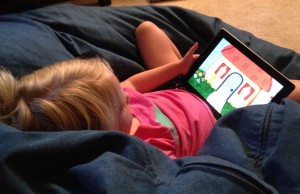A digital citizen is someone who is a member of a worldwide community that is linked by the internet. What does it mean to be good a good digital citizen today? And how can you best teach your children to be a good digital citizen?
 First of all, when we think of citizenship, we think of the community in which we live and how we interact with our community members. There are rules we live by every day in our community, from obeying stoplights and street signs to treating our neighbors with respect and kindness to understanding that there are things we just don’t share with other people about ourselves or our families. And we learn to protect ourselves, our families and our friends and report illegal activity. Online, it seems to be more difficult.
First of all, when we think of citizenship, we think of the community in which we live and how we interact with our community members. There are rules we live by every day in our community, from obeying stoplights and street signs to treating our neighbors with respect and kindness to understanding that there are things we just don’t share with other people about ourselves or our families. And we learn to protect ourselves, our families and our friends and report illegal activity. Online, it seems to be more difficult.
Really, being a good digital citizen is no different, but because there are more communication channels, there are more things of which to be aware. And it’s not just the things I’ve spoken about already, but there are more things to consider.
- I’ve spoken about bullying and what to do if your being bullied, but what if you or your children are perceived as the bully? Even if you don’t think you’re being mean, it doesn’t really matter as perception is the true reality. What this means is that no matter how you think your acting, what matters is what people see. If you’re an actor on the stage, and you think you should win an Oscar, but people boo you at the end of the show, what counts? Making sure that you are not perceived as a bully online is key.
- Protecting you, you’re family and friends. We are always learning things about people in our circles that are either private or inappropriate to share. It may not be as serious as credit card numbers and when you’re going on vacation, but it could be that someone you know is pregnant or some friends are breaking up, or even that you’re going to a friend’s house when other people aren’t invited. These are things that can hurt feelings and it’s important to be aware of the consequences of sharing.
- Not sharing what you don’t know. There are so many scams and spams out there to be careful of that it’s hard to know what true or not. From Nigerian Prince’s to wikipedia research for a school paper, it’s just hard to know if it’s true or not. When in doubt, leave it out. And if you do use online research for something, make sure it’s verifiable.
- Staying legal. It’s incredibly important to make sure that anything you do online is safe and legal. That means everything from respecting Facebook’s (and other sites) privacy policies and age limits (13 for most) to not forwarding inappropriate pictures and texts and to reporting people and sites that promote illegal or inappropriate activity. If you do nothing, then someone else could be hurt by it.
- Learn when to use your digital tools – and of course, when not to use them. Your kids will mimic your activity and what you do, so before you get mad a them for checking their phones during dinner, make sure you’re not checking yours at dinner. There are times to turn off and I encourage you to find the time and turn off your digital world.
It’s never to late to practice good digital citizenship with your children. And this doesn’t stop with your children, either. You can be a leader in your house, school, community and world to make the internet a better place.


